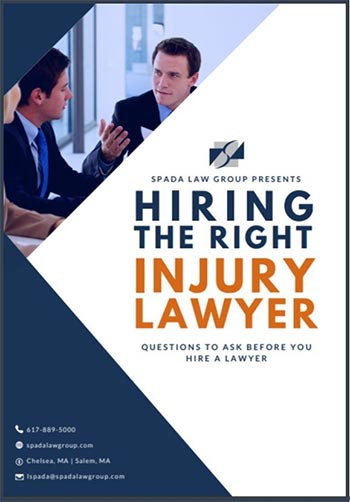A Step by Sep Guide for Injured Workers to Get the Compensation They Deserve:
The purpose of this blog is to give anyone who has been injured on the job in Massachusetts a brief overview of what their rights are, what they are entitled to and what they need to do to pursue Worker’s Compensation benefits.
Overview of Massachusetts Workers’ Compensation Law![How to Collect Workers’ Comp Benefits in Massachusetts]()
The Massachusetts workers’ compensation law is designed and intended to provide financial compensation to employees who are injured on the job or contract a work-related illness. The law requires employers to provide workers’ compensation (WC) insurance coverage for all their employees and in return the law limits employer exposure to lawsuits from employees for workplace injuries and illnesses (except in cases of willful negligence). This insurance pays for any reasonable and necessary medical treatment related to the injury or illness and pays partial compensation for lost wages after the first 5 calendar days of total or partial disability.
What to Do If You Are Hurt on The Job or Contract a Work-Related Illness?
First and most importantly, notify your employer immediately that you were injured or became ill while on the job. Then, if you can’t earn wages for 5 full or partial calendar days (and the days do not have to be consecutive) due to your injuries or illness you become eligible for weekly compensation benefits under the law. Once you become eligible for these benefits your employer must file the Employer’s First Report of Injury/Fatality form, which is typically done electronically.
How Does the Process of Getting Your Weekly Wages Work?
Once your employer’s worker’s comp insurance company receives the proper forms from your employer, they have 14 calendar days to pay you benefits or to denying your claim. Just because the insurance company begins paying your claim during this 14-day period however, it does not mean they have fully accepted your claim. They have up to 180 days during which they can stop or modify your payments so long as they give you 7 days’ notice that they intend to stop or modify the payments. After this 180-day period, the insurance company can only stop or modify payments for very specific reasons.
What if My Weekly Benefits are Stopped or Reduced?
If your payments are stopped or modified after the initial 180-day period, you may request a Conciliation to dispute their decision.
A Conciliation is simply a meeting between your company’s insurance carrier and you (and hopefully your lawyer). At the Conciliation your lawyer will try to resolve any disputes and get your payments reinstated. If you are unsuccessful at the Conference in resolving the issue, the next step is to schedule a Conference.
The Conference is also an informal proceeding even though now you appear before an Administrative Judge at the Department of Industrial Accidents (DIA), which is the administrative body that is charged with adjudicating issues arising out of Massachusetts Worker’s Compensation laws. At the Conference, you will need only prove the following: (A) that you were disabled from work; (B) your injury or illness was work related; and (C) that your medical bills were for reasonable and necessary treatment. The judge will hear your evidence on these issues and issue an order to either reinstate your benefits or to uphold the insurance company’s decision to deny your benefits. If either side doesn’t agree with the judge’s decision, they have a right to appeal to a Hearing.
The Hearing is where the process gets more formal. The same judge who you were before at the Conference will now hold a formal proceeding and will consider all the evidence. Just like in any other trial in Massachusetts, there will evidence taken in the form of witness testimony and documents submitted. The witnesses will be sworn in under the pains and penalties of perjury and the rules of evidence will apply. After the Hearing, the judge will make written findings and issue a decision. And, you guessed it, if either party to the case believes the judge got it wrong they may file an appeal to the Reviewing Board.
If you are unfortunate enough to get to this last stage your case will be heard by a panel of 6 Administrative Law Judges. The Reviewing Board can do any of the following: reverse the decision of the Hearing Judge; send the case back to the Hearing Administrative Judge if they determine an error was made; or uphold the Judge’s decision. Decisions of the Reviewing Board can be appealed within 30 days to the Massachusetts Appeals Court.
What Types of Worker’s Compensation Benefits are Available?
Depending on the nature and severity of a worker’s injuries, the following benefits may be available:
- Partial Disability Benefits. These benefits are available to workers who have been injured and, as a result, are limited in the amount or type of work they can perform. The law allows workers to collect 60 percent of the wages that they would have earned but for their injury, or 60 percent of what was lost as a result of the accident. These benefits are paid weekly.
- Disfigurement or Loss of Function. These benefits are paid when a worker is disfigured or suffers a loss of function of a body part. This could mean anything from a permanent scar on one’s face or neck to a person who has lost function of an arm, leg, eye or another body part.
- Total Disability Benefits. This type of benefit is available to workers who cannot perform work because of their work injury. Workers who receive total disability benefits may obtain 60 percent of their average weekly pay (with a max amount capped by state law). That weekly amount is determined by averaging what the worker earned in the 52 weeks prior to injury. Workers can receive total disability benefits for up to three years.
- Total and Permanent Disability Benefits. State law allows an employee who is unable to work for an extended time due to a work injury to receive total and permanent disability benefits. This will allow an eligible worker to receive weekly benefits possibly for the remainder of the worker’s life.
- Death Benefits. These are benefits available to a surviving spouse and children of a worker who died because of a work-related injury or illness. Benefits are two-thirds of the deceased employee’s average weekly wage with certain maximum limits. A surviving spouse (or recipient) may also request a cost of living adjustment increase after two years of receiving benefits. Burial expense benefits are also available.
Can I Sue My Employer for A Work Injury?
The short answer is probably not. The Massachusetts Worker’s Compensation law makes the receipt of worker’s comp benefits the sole remedy for employees injured on the job. Therefore, employers are typically immune from lawsuits by their employees. There is one not too uncommon exception to this rule. If your employer does not carry workers’ compensation coverage you may sue them. If you choose not to sue in this situation you may also file a claim with the Department of Industrial Accidents and seek workers’ compensation benefits from the Workers’ Compensation Trust Fund. This Fund is set up to assist injured workers who find themselves in the unfortunate situation of being injured on the job and their employer failed to carry the required insurance.
What if I Was Injured While Working but It Was Someone Other Than My Employer Who Caused the Accident?
You are not allowed to sue your employer from whom you are receiving worker’s compensation benefits. However, you may be able to bring a claim against any other responsible parties. For example:
- If you are a truck driver and you are hurt in a motor vehicle accident, you can’t sue the company you work for, but you may be able to sue the driver who caused the accident.
- If you slipped and fell on a wet floor at work, you cannot sue your company, but you may be able to sue the cleaning company hired to wash the floors and negligently failed to warn workers that the floor was wet.
These are two simple examples of the hundreds of different scenarios that could give rise to a third-party lawsuit. We regularly file suit on behalf of injured workers who have been injured on the job as the result of another person’s negligence.
The best thing you can do if you are injured at work and want to be compensated is to understand your legal rights before you make any decisions. Before you speak to an insurance company adjuster, sign or submit any paperwork or hire a lawyer, you owe it to yourself to get as much information as you can, so you can make a smart decision on what you need to do next. At Spada Law Group, we offer free consumer guides and videos that answer many of the questions injured workers have. Take a look, download our free information or contact us for a free consultation. Learn what Spada Law Group is all about and how we might be the right workers’ compensation lawyers for you.




